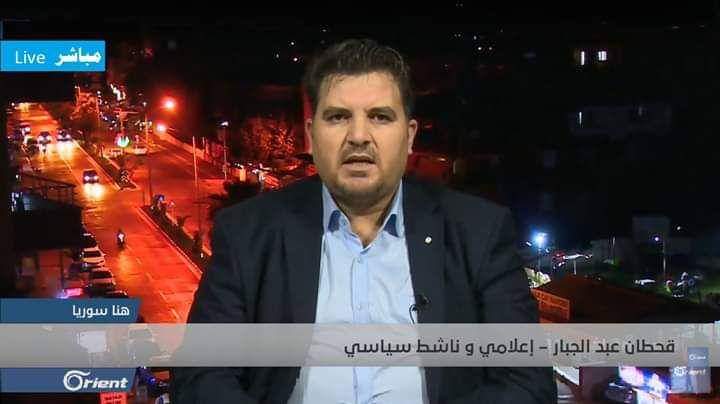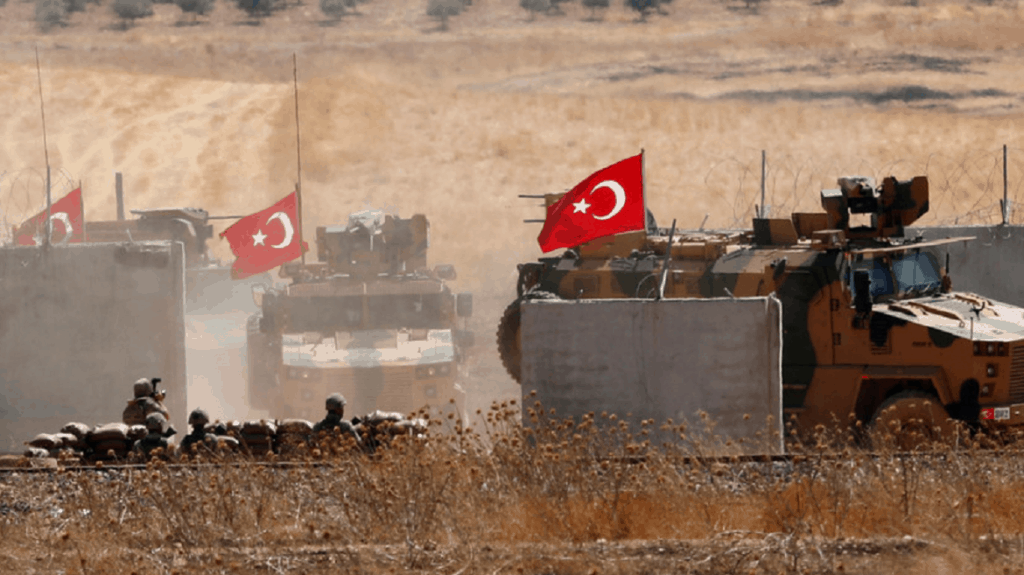By Denis Korkodinov – Interview with Kahtan Shark
On October 22, 2019, Russia and Turkey entered into an agreement on an operation to provide a buffer zone in northeastern Syria. This agreement provides for joint patrolling and coordinated actions with Syrian forces to remove Kurdish militants from the area. In turn, the terms of the agreement do not change Ankara’s desire to protect its borders from PKK and YPG at all costs. And, apparently, the international community agrees.
Especially for World Geostrategic Insights, we talked about this with Kahtan Shark, Syrian political analyst who live in Turkey, president of the Coalition against the PKK.

1. In describing the UN Security Council scenario of the military operation “Source of Peace”, Recep Erdogan noted that this operation will be “proportional, balanced and responsible.” In particular, through his ambassador to the UN Feridun Sinirlioglu, the Turkish leader noted that “the operation will be directed only against terrorists and their shelters, firing points, vehicles and equipment with weapons.” In this regard, to what extent are the activities declared by Ankara proportional to the potential threat from YPG? To what extent are these actions of Turkey balanced and responsible, from the point of view of the United Nations?
– The operation “Source of Peace” against the Kurdish armed groups “RKK” and “YPG” in northeastern Syria was the result of a series of provocations carried out by these organizations against Turkey. In turn, war crimes committed by Kurdish militants, despite the intense presence of an international coalition fighting the Islamic State, did not concern the international community.
PKK and YPG took advantage of this, resulting in a surge of violence in the immediate vicinity of the Turkish border.
Since the start of the military campaign against ISIS in September 2014, YPG, RKK and SDF have been the backbone of the ground forces on the side of the international coalition. However, under the banner of the war with the Islamic State, another war began, aimed at creating an independent Syrian Kurdistan, in connection with which Kurdish armed groups began the persecution and murder of the local population, mainly Arabs and Turkoman, in cities such as Manbij, Zarin, Ain el-Arab (Kobani), Tell Abyad, Ras al-Ain, Kamyshly, Raqqa, Ain Issa, Hasaka. For this reason, there are now more than 3 million Syrian refugees from these cities in Turkey.
In addition to war crimes against the Syrian people, Kurdish armed groups actively used extremist slogans and promoted the views of Abdullah Ocalan, accused of a terrorist plot against Turkey.
Under such conditions, when it became obvious that the defense of the Turkish state was of no interest to anyone but the Turks, Recep Erdogan made the only right decision – to launch Operation Source of Peace, aimed at eliminating the terrorist threat.
The Charter of the United Nations provides for the legal right of states to fight terrorists. In addition, there is an agreement between the Turkish and Syrian governments of 1998, the conclusion in Adana.
One of the provisions of the Adan Agreement provides for the right of Turkey to prosecute terrorists and their accomplices in Syria. For this, Ankara relies on the forces of the “Syrian National Army”, consisting of Syrian citizens who were expelled from their homes by the Kurds.
The Turkish army fulfills its mission within the framework of international law, protecting people, property and preventing violations.
More importantly, Turkey acts solely against Kurdish militants and is not targeted at civilians, as evidenced by hundreds of independent journalists who provide information coverage of Operation Source of Peace. For this reason, Turkey’s actions in northeastern Syria are fully proportional to the terrorist threat and balanced. At the same time, Recep Erdogan took full responsibility for every step of the Turkish army participating in Operation Source of Peace.
2. As a justification for hostilities in Syria, the Turkish President referred to Article 51 of the UN Charter, which provides for the state’s right to self-defense against armed attack. Is this interpretation of the military necessity of Ankara wrong from the point of view of international law? Is Recep Erdogan’s reference to Article 51 of the UN Charter?
– Any country that is subjected to military attack has the right to self-defense. Turkey, whose actions are dictated by the protection of its territory and its people, is no exception.
On the eve of Operation Source World, Recep Erdogan informed the ambassadors of large countries and the UN about the timing, directions of the operation, as well as the composition of the Turkish armed forces. At the same time, the Turkish leader accompanied his report with detailed documentary evidence of the crimes committed by RKK and YPG in northeastern Syria.
International law is not an obstacle in this process if this process relieves the state and the population of any risk from terrorist organizations.
There is no mistake here. I repeat that absolutely any state that would be attacked by terrorists, without hesitation, would use military force to respond. Therefore, Ankara was not only entitled, but also obliged to respond with the help of weapons to the actions of Kurdish militants. In the end, this is true, since the Turkish people have long suffered pressure from the “RKK” and “YPG”. Now for the Kurds, the hour of reckoning has come.
3. It is worth noting that Russia, at an emergency meeting of the UN Security Council on October 11, 2019, blocked a statement on international condemnation of the Turkish military operation. Washington and Beijing, in turn, supported Moscow, which, to a certain extent, gave rise to Recep Erdogan to declare that his actions were agreed upon and supported by international partners. Are Moscow, Washington, and Beijing really the informal guarantors of the “Source of Peace” military operation? Can it be considered that Moscow will sooner or later take the initiative in organizing a negotiation process between Turkey and the Syrian Kurds?
– Kurdish armed groups are only militias that are temporarily used by both Moscow and Washington for a limited period of time. This was said by the former ambassador to Syria Robert Ford many years ago. However, Kurdish militants did not heed the advice not to rely entirely on Washington or Moscow, because these international players would not guarantee them protection. In this regard,
US President Donald Trump was more clear. He said that “we gave the Kurds money and weapons to fight ISIS, but we did not promise them anything else.”
In the end, the efforts of Washington or Moscow will not succeed in stopping the war in Syria or reaching final solutions. These are only temporary solutions that will soon be forgotten, because any agreement between Bashar al-Assad and the Kurdish forces is simply a political cover for the lack of progress of the Turkish forces.
Ankara will never accept any negotiations with a terrorist organization, despite previous attempts by Washington and Moscow.
4. As a result of Operation Source of Peace, leading international players directly or indirectly sided with Bashar al-Assad. So, even US President Donald Trump was forced to change his harsh criticism of official Damascus to a neutral-benevolent attitude. In addition, in the light of the Turkish offensive, Iraq has taken the initiative to return Syria to the League of Arab States. Does this mean that Operation Source of Peace, to some extent, allows Syrian President Bashar al-Assad to strengthen his position both domestically and internationally? In the end, if not for the actions of Turkey, the American troops would not have left Syria, would Damascus not have the opportunity to restore its membership in the League of Arab States and would not have in the future a real chance to claim compensation payments caused by the Turkish military campaign? In this sense, Turkey, formally advocating the overthrow of Bashar al-Assad, rendered him very good help, creating for him the image of a “sacrifice that everyone pities”? Is it really? Does this mean that the operation “Source of Peace” has received the approval of official Damascus and is fully coordinated with it, and the confrontation shown by the international press between the Syrian government forces and the Turks is only a fraud aimed at an inexperienced audience in political games?
– The Turkish military operation “Source of Peace” leads to the elimination of the terrorist threat emanating from the “RKK” “YPG”. Moreover, no agreements between Ankara and Damascus were and could not be.
The Syrian President aims to regain control of the entire territory, including the Turkish operation zone. For this reason, he launched an offensive in the north-east direction. But even this does not at all indicate that, formally speaking out against Turkey, Bashar al-Assad hastened to save the Kurds. In fact, the Kurds are not of great interest to Damascus, which seeks to regain its control over the territory at the pre-war level, that is, as of 2011. In this regard, the goals of the Kurdish armed groups and Bashar al-Assad are different: if the former seek to secede from official Damascus, the latter intends to subjugate the Kurds to the central government.
It is worth noting that a number of Arab and European states expressed support for the regime of Bashar al-Assad against the background of the operation “Source of Peace”. And even Baghdad took the initiative to restore Damascus membership in the League of Arab States. However, these are just words. And it is unlikely that these words will be followed by concrete actions to protect the regime of Bashar al-Assad. The fact is that the main goal of the pro-Syrian information campaign launched in the international press is solely to demonize Turkey at all costs. Syria acts only as an excuse for this, since many international players, in fact, do not care what happens to Syria and Bashar al-Assad. And I am sure that many of those who now support Syria do not even know where this country is on the world map. However, they support her in order to thereby oppose Turkey.
Meanwhile, for the first time, we felt that US policy was vague and unstable. This policy had disastrous consequences in Syria: Iranian influence expanded, RKK and YPG became a real threat to Turkey. And in this scheme, the Syrian people are the biggest loser: both the opposition and supporters of Bashar al-Assad, who are forced to bear the burden of hostilities.
The position of the international press, which criticizes countries for the Syrian crisis, does not reflect the truth. Correspondents are trying to inform their readers that they are the “face” of the tragedy in Syria. However, this “face” is just the attitude of the press, because in reality the international community does not have a clear understanding of how to end the war in the SAR and protect the Syrian people.
5. Is there a risk of armed clashes between the Turks and the Syrian government forces, as well as with the Russian military in Manbij and its environs?
– It is unlikely that there will be any clashes between the Turkish army and the Syrian or Russian forces, since there is a clear non-aggression agreement between Ankara, Damascus and Moscow.
It should be emphasized that, although the political agreements between the countries may change, the only constant in the equation is geography, the consequence of which no one can prevent Turkey from protecting its borders.
Image Credit: Reuters







